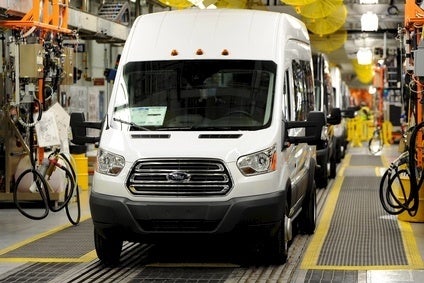
After a US$1.1bn spend and the creation of 2,000 jobs, Ford’s Kansas City Assembly Plant has begun Transit van production, heralding the eventual end of the long-running domestic E-series line.
The full size van line goes on sale in the summer aimed at tradespeople and businesses with increased capability and new configurations compared to its predecessor.

Discover B2B Marketing That Performs
Combine business intelligence and editorial excellence to reach engaged professionals across 36 leading media platforms.
It’s the latest One Ford model for global sale, using common platforms. Variants including the smaller Tourneo/Connect variants are built in other plants in Turkey and Spain and by joint ventures with Sollers in Russia and Jiangling in China.
Joe Hinrichs, Ford president of The Americas, said: “Our investment in Kansas Cityfor Transit production is about delivering world-class commercial vans for a new generation of commercial customers – while building on our decades of leadership in the market.”
The 2,000 new employees at Kansas City puts the company more than 75% toward its goal of creating 12,000 hourly jobs in the United States by 2015.
While the European Transit has been around since 1965 – it was the first vehicle developed, built and sold by both Ford’s then separate English and German units – and is currently sold in 118 markets on six continents, in the US it eventually will replace America’s best-selling van for 35 years, the E-series van, first sold in 1961 as the Econoline. The older vans and wagons still be sold alongside the Transit during 2014 while the E-Series cutaway and stripped chassis (basis of many an airport or hotel shuttle bus) will continue to be built and sold throughout most of the rest of this decade.
The high-roof Transit claims best-in-class 81.5 inches of maximum interior cargo height with enough headroom for a person 6 feet 8 inches tall to stand upright in the cargo area.
The van offers as much as 487 cubic feet of cargo volume and 4,650 pounds of maximum payload capacity – more than General Motors and Chrysler rivals. The van has a maximum towing capacity of 7,600 pounds.
Ford noted that, in some configurations, the Transit offers as much as 75% more cargo volume than the largest E-Series. Maximum payload increases more than 600 pounds across the Transit van line versus comparable E-Series.
US buyers will be offered three body lengths, two wheelbases on van and wagon and three roof heights; in van, wagon, chassis cab and cutaway body styles; and in XL and XLT trim levels.
Moving from an all-petrol engine lineup of two V8s and a V10 in the E-Series, and the almost all-diesel European range, the US Transit has a standard 3.7-litre petrol V6 with the F-150 truck’s 3.5-litre EcoBoost or a 3.2-litre Power Stroke diesel optional. Each engine has a six-speed automatic transmission.
Kansas City also produces the Regular, Super and Crew Cab Ford F-150 models and employs 4,878 hourly workers on three shifts – the last was added in the third quarter of 2013.
Expansion projects accounting for some of the $1.1bn plant preparation spend include the addition of a 437,000 square foot stamping facility and a 78,000 square foot paint shop using three-wet and two-wet monocoat paint processes that are more environmentally friendly and take less time than conventional paint coating.
There are about 550 new robots in the body shop, 700 new assembly tools in trim and chassis, and 18 new conveyor systems totaling 5,565 feet.
Kansas will also build the redesigned 2015 F-150 after the truck launches at the Dearborn Truck Plant late in 2014.
To supply the plant for the Transit, stamping provider Cosma International, instrument panel assembler Piston Automotive and headliner manufacturer Grupo Antolin built new facilities near the plant. Seat supplier Magna International expanded its current local factory and companies like Knapheide and Utilimaster, a subsidiary of Spartan Motors, have established local facilities near the plant to fit out completed vans for buyers’ specific needs.






